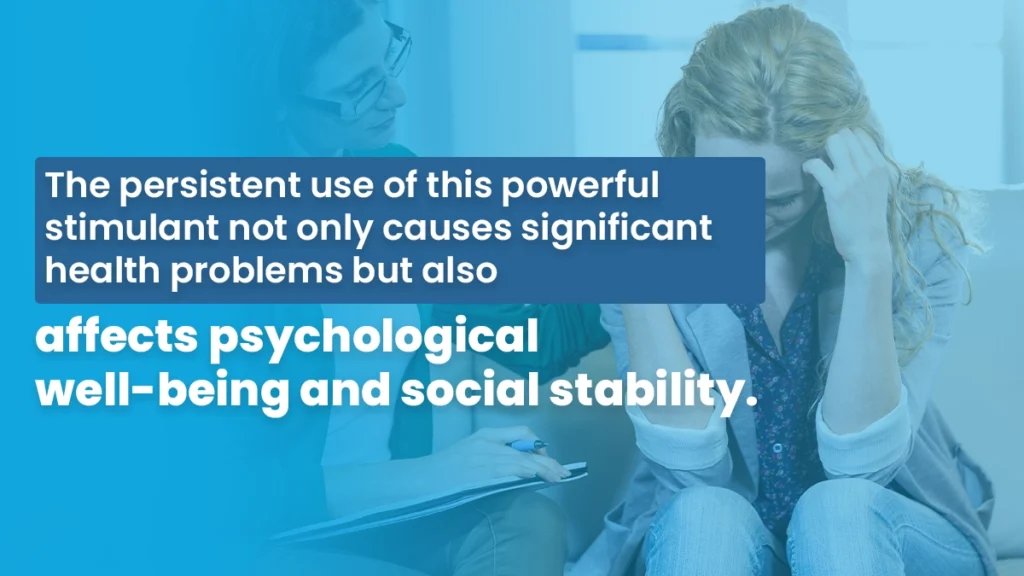Methamphetamine, commonly known as meth, is a potent and addictive stimulant that can have serious consequences on your body and central nervous system (CNS). Meth often comes in the form of a white, odorless, and bitter-tasting crystalline powder.
Meth use can lead to a rapid heart rate and other severe health issues. This article will help you understand the short-term and long-term effects of meth, along with meth treatment available to patients striving to overcome meth addiction and live a stable life.
Key Takeaways
Methamphetamine use leads to severe physical and mental health issues. Here’s what you need to know:
- Short and long-term meth use causes profound brain changes and affects decision-making abilities.
- Adolescents and pregnant women are especially more likely to experience meth’s harmful effects.
- Comprehensive treatment for meth addiction, such as detox and strong support systems, are effective for recovery.
The Haven Detox-Little Rock is here to support your recovery journey. Call (501) 271-3342 today to learn about our treatment plans.

Historical Background On The Rise Of Meth
Methamphetamine has a complex and troubling history. Originally synthesized in the late 19th century, it saw significant use during World War II to keep soldiers alert.
By the 1990s, methamphetamine misuse surged in the United States, fueled by illegal production in makeshift labs. This period marked the beginning of widespread methamphetamine use disorder, with individuals experiencing severe negative effects such as high blood pressure and rapid heart rate. Higher doses led to even more severe health issues, including chronic methamphetamine use, which impairs decision-making and causes long-term cognitive deficits.
The rise in methamphetamine use can be attributed to its initial accessibility and the intense, albeit short-lived, euphoria it provides. However, the negative consequences far outweigh the temporary high, with individuals often facing long-term physical and mental health challenges.
Risky patterns of meth use and the diversity of people who used meth increased between 2015 and 2019, as per a report by the National Institute of Health (NIH). The combined use of methamphetamine rose by sixty percent. Additionally, frequent methamphetamine use, defined as using it for at least a hundred days in the past year, increased by sixty-six percent. These findings indicate a growing trend in risky usage patterns, which may have contributed to an increase in overdose deaths.
Short-Term Impact On Your Body
The use of methamphetamine can lead to various immediate effects on both the body and mind. These short-term impacts are often what draw people to this powerful stimulant but also contribute to its dangerous reputation. Understanding these effects can help illustrate why meth is considered one of the most harmful illegal drugs.
Physical Effects
The use of methamphetamine, a powerful stimulant, has immediate and severe physical effects on the body. One of the most common physical effects is increased blood pressure, which can put a significant strain on the cardiovascular system. Additionally, hyperthermia, or elevated body temperature, is a frequent consequence of meth use, posing serious health risks.
Crystal methamphetamine, often referred to by street names like “crystal” or “ice,” can cause rapid weight loss due to its appetite-suppressing properties. These physical effects can lead to an increased risk of long-term health complications, making meth one of the most dangerous illicit drugs.
Psychological Effects
The psychological effects of substance use are equally concerning. As a powerful stimulant, meth can induce intense wakefulness and euphoria, but these are often followed by negative effects such as anxiety attacks, paranoia, and auditory hallucinations.
The mental health risks of methamphetamine use are profound, often leading to violent behavior and erratic decision-making. The abuse of this illicit drug can result in severe psychological dependence, further exacerbating mental illnesses. Despite the temporary euphoria, the use of methamphetamine quickly leads to significant psychological distress.
Devastating Long-Term Impact On Health
Long-term methamphetamine use leads to severe and lasting impacts on various aspects of an individual’s life. The persistent use of this powerful stimulant not only causes significant health problems but also affects psychological well-being and social stability. Understanding these effects can help in recognizing the extensive damage caused by prolonged meth use.
Physical Health Consequences
The physical symptoms of long-term methamphetamine use are profound. One of the most serious health effects is a variety of cardiovascular problems, including myocardial infarction (heart attack). Chronic individuals often suffer from severe tooth decay, commonly referred to as “meth mouth,” due to the drug’s acidic nature and the neglect of oral hygiene.
Misuse of methamphetamine may cause skin sores and infections due to poor hygiene and compulsive skin picking. These health problems increase the risk of fatal overdoses and other life-threatening conditions, making meth a highly dangerous substance.
Psychological And Cognitive Consequences
The psychological and cognitive effects of long-term methamphetamine use are equally debilitating. Individuals often experience memory loss, which can impair daily functioning and quality of life. Increased aggression and violent behavior can result from the drug’s effects on the brain’s emotional regulation.
Moreover, the ability to adapt to new situations or switch between tasks may be impaired. These mental health effects contribute to a variety of adverse outcomes, making it difficult for individuals to maintain stability and safety.
Social And Economic Consequences
Long-term methamphetamine use also has severe social and economic repercussions. Employment problems are common, as the drug’s impact on physical and mental health reduces an individual’s ability to work effectively.
Relationship strain is another significant issue, with the erratic behavior and health problems caused by meth use leading to conflicts and breakdowns in personal connections. Legal issues frequently arise as well, given the illegal nature of the drug and the risky behaviors associated with its use. These social and economic consequences further entrench individuals in a cycle of instability and hardship.
Meth Impact On Brain Chemistry
Long-term methamphetamine use has a profound impact on brain chemistry. One of the primary effects is the alteration of neurotransmitters, the chemicals responsible for transmitting signals in the brain. Meth is highly toxic to neurons. It can damage or kill brain cells, particularly those that use the neurotransmitter dopamine.
This damage can lead to long-term cognitive deficits and motor impairments. Methamphetamine use leads to a significant increase in dopamine levels, causing intense feelings of euphoria. However, this surge in dopamine depletes serotonin, another crucial neurotransmitter, which can lead to mood swings and depression.
Additionally, meth use causes structural brain changes, damaging areas responsible for memory, learning, and emotional regulation. The limbic system, which handles our emotions and motivation, is particularly affected, resulting in impaired decision-making and increased impulsivity. These changes highlight the severe and lasting damage that meth can inflict on the brain.
Consequences On Specific Populations
Long-term methamphetamine use affects various populations differently, with adolescents and pregnant women being particularly vulnerable to its harmful consequences.
Adolescents
Adolescents who use crystal meth are at a high risk of severe health and psychotic symptoms. The developing teen brain is especially vulnerable to the effects of meth, leading to significant disruptions in brain chemistry.
In 2021, the National Survey on Drug Use and Health found that approximately 0.9 percent of individuals aged twelve and older, which equates to around 2.5 million people, reported using meth in the previous year. Adolescents are also at a higher risk of engaging in risky behaviors such as reckless driving, which can lead to legal issues and traumatic brain injury.
Pregnant Women And Infants
The use of methamphetamine during pregnancy poses serious risks to both the mother and the unborn child. Pregnant women who use meth experience heightened blood pressure and damage to blood vessels, increasing the risk of heart attack or death.
For infants, exposure to meth in the womb can lead to premature birth, low birth weight, and developmental problems. Methamphetamine-related health issues in infants can include difficulty feeding, irritability, and delayed growth. The impact on the brain’s development can result in long-term cognitive and behavioral problems, requiring early intervention and medications to manage these challenges.
Treatment To Beat Meth Addiction
Overcoming methamphetamine addiction requires a comprehensive approach, addressing both the physical and psychological phases of the addiction. Effective treatment includes detoxification, behavioral therapies, and support systems.
Detoxification
The first step in beating meth addiction is detoxification. This process involves allowing the body to rid itself of the drug while managing withdrawal symptoms.
A healthcare professional should supervise detox to ensure safety and address any complications such as irregular heartbeat or other severe health issues. This step helps stabilize the patient and prepares them for further treatment.
Behavioral Therapies
Behavioral therapies are crucial in treating meth addiction. These therapies aim to change the patient’s thinking and behavior patterns related to drug use. Cognitive-behavioral therapy (CBT) helps patients recognize triggers and develop coping strategies.
Contingency management offers incentives for staying drug-free. These therapies work by altering brain chemicals and improving mental health, reducing the chances of relapse.
Support Systems
Strong support systems play a vital role in recovery. Support from family, friends, and support groups provides emotional encouragement and accountability. Group therapy and 12-step programs offer a community of individuals facing similar challenges. These systems help patients stay motivated and committed to their recovery journey.
Frequently Asked Questions (FAQ)
What are the short-term effects of methamphetamine use?
The short-term effects of methamphetamine use include a rapid heart rate, increased energy, and intense feelings of euphoria. Individuals often experience heightened alertness and reduced appetite, which can lead to weight loss.
Other effects include hyperthermia, or a dangerously high body temperature, and a feeling of increased physical strength. However, meth also causes negative side effects like uneasiness, paranoia, and violent behavior. These immediate effects can be very intense, but they come with significant risks to both physical and mental health.
How does methamphetamine affect the brain?
Methamphetamine affects the brain by causing a big increase in dopamine, a chemical that makes you feel pleasure. This makes people feel very happy and energetic at first. But over time, the brain’s natural balance gets disrupted.
The drug also reduces serotonin, which can lead to mood swings and depression. Long-term use harms brain areas responsible for recollection, understanding, and emotions. This can lead to problems with thinking clearly, making decisions, and controlling feelings. The damage to the brain’s chemicals and structures can have lasting effects on mental health and behavior.
Can methamphetamine use lead to mental health issues?
Methamphetamine use can lead to serious mental health issues. It can cause tension and hallucinations, making you see or hear things that aren’t real. Long-term use can result in memory problems and difficulty thinking clearly. People may also experience severe mood swings and depression.
The drug disrupts brain chemicals like dopamine and serotonin, which can worsen these issues. Over time, these mental health problems can become severe and may require professional treatment to manage effectively.
Seek Help At The Haven Detox-Little Rock
If you or your loved one is struggling with meth addiction, understanding its severe consequences is crucial for seeking help. Meth use can lead to profound issues that significantly impact your life.
The Haven Detox-Little Rock is here to support you through every step of recovery. We offer comprehensive detox services to help you safely rid your body of meth and stabilize your overall health. Our residential rehab program provides a supportive environment with 24/7 medical care for long-term recovery. Additionally, we offer IV therapy to address nutritional deficiencies and support your overall health.
Let us become part of your recovery journey. For more information, feel free to contact us at (501) 271-3342 today.




